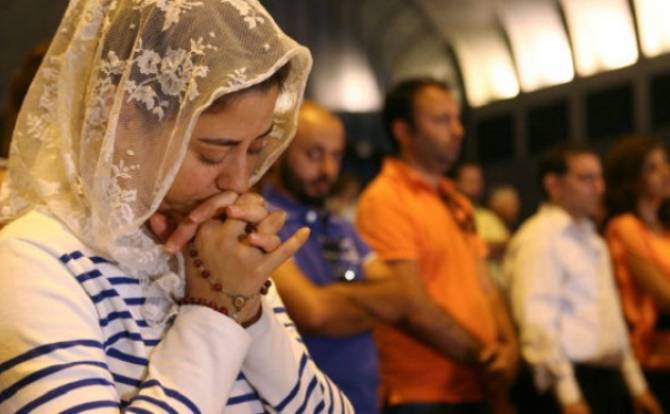AMMAN — Arab Christians are viewing with growing concern and revulsion an uptick in kidnappings of both their clergy and civilians as violence worsens in Syria and Iraq.
In mid-July, another Catholic clergyman went missing in Syria, making him possibly the eighth clerical victim of apparent abduction in the war-ravaged country.
Melkite Fr. Tony Boutros, 50, and his Muslim driver were first reported missing by the Syrian Observatory for Human Rights.
The Britain-based watchdog, which tracks the conflict using sources on the ground, said the priest serving in the southern city of Shahba was believed to have been kidnapped by unknown assailants after celebrating Mass July 12.
The news followed the release of Fr. Dhiya Aziz, an Iraqi Franciscan serving in northwest Syria, who was abducted July 4 and freed five days later. Aziz was serving as a parish priest at Yacubieh, a village in Syria’s Idlib province.
Pope Francis demanded July 9 an immediate end to “a form of genocide” of Christians taking place in the Middle East and beyond, describing it as a “third world war.”
“Today we are dismayed to see how in the Middle East and elsewhere in the world many of our brothers and sisters are persecuted, tortured and killed for their faith in Jesus,” Pope Francis said.
“In this third world war, waged piecemeal, which we are now experiencing, a form of genocide is taking place, and it must end,” the pontiff said.
The Franciscan Custody of the Holy Land reported the priest’s release, noting that he had been treated well during his ordeal.
The Jerusalem-based organization said that Jabhat al-Nusra, the al-Qaida affiliate in Syria, apparently assisted in securing the priest’s release from another group responsible for the abduction.
“The Custody does not forget that other religious are still missing in Syria, and it invites everyone to continue praying for peace in this country,” said the organization, which that protects Christian sites throughout the Holy Land.
In May, Syriac Catholic Fr. Jacques Mourad was kidnapped from the St. Julian Monastery near Qaryatayn, where he is the superior.
Over the years, Mourad worked to restore the monastery located in the Syrian desert. He has also been instrumental in working to improve relations among Muslims and Christians.
Such incidents underscore the “significant danger of kidnapping at the hands of a wide range of extremist or opportunist groups, faced by many communities in Syria and Iraq,” the Christian rights group Middle East Concern said on the rising number of abductions.
“Minority communities feel especially vulnerable to abduction, including kidnappings for ransom,” it said.
Christian civilians are also under increasing threat of abduction.
In late June, four Christians were abducted in the Iraqi capital of Baghdad. The abductions resulted in the deaths of two people, even though ransoms had been paid by family members. The others were released including one following police intervention.
Chaldean Catholic leaders in Iraq expressed “deep regret” over the worsening security situation as groups and individuals target “innocent people” to kill them or extort money.
Christians are “fully fledged citizens of the state,” the Chaldean Patriarchate said in a statement following the incidents.
“Over hundreds and hundreds of years, they have contributed to (Iraq’s) civilization and its culture.” This is why “we appeal to government authorities and security forces in Baghdad, to protect the lives and property of our people.”
The statement released noted that perpetrators were “falsifying the documents of Christian homes and seizing them and their household goods.” Threatening messages also are being sent “through their mobile phones ordering them to leave their jobs,” it said.
Imad Youkhana, a Christian member of Iraq’s parliament, issued a statement on July 9, condemning the violence and urged Iraqi authorities to provide greater protection of its Christian citizens. The lawmaker claimed that the violence is part of an intimidation campaign to force Christians to emigrate, but noted the wider impact was to undermine the unity of Iraqi society.
An Iraqi NGO, the Hammurabi Human Rights Organization, issued a similar appeal in mid-July for the protection of the country’s Christians.
Meanwhile, the fate of more than 200 Assyrian Christians abducted by the Islamic State militants in northeastern Syria in February remains unknown.
“The fire is burning throughout the Middle East and a culture of fear is growing,” warned Fr. Rifat Bader, director of the Catholic Center for Studies and Media in Amman.
He said that deepening conflict in Syria and Iraq helped to fuel more religious extremism and unimaginable acts of violence.
“For Christians in the burning Middle East, religion must not be part of the problem, but part of the solution,” Bader said.
But the Catholic priest noted that with regional instability and sectarian violence on the rise, kidnapping and killing perpetrated against Arab Christians are forcing many to leave their ancestral lands because no lasting solutions to the current dilemma have been identified.
Source: Aina.org






